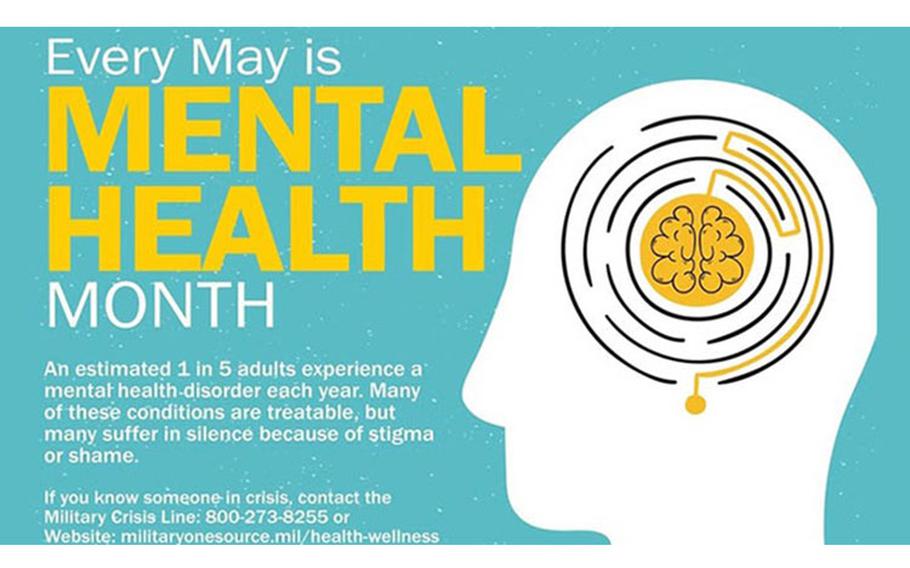Health
Together for Mental Health: May is Mental Health Awareness Month
Navy Region Hawaii Public Affairs May 17, 2022

Every May is Mental Health Month. If you know someone in crisis, contact the Military Crisis Line: 800-273-8255. (Photo: MHS Communications) ()
Health is wealth, especially when dealing with mental well-being. Growing up, kids are taught if they are hurt physically in any area, to seek help. The same should go for anyone's mental health.
Lt. Nicholas Grant, the embedded clinical psychologist for Naval Surface Group Middle Pacific, expressed his thoughts on mental health.
"Mental and physical health are interconnected. Mental health is a core component of overall health, and a holistic perspective is important in order to understand the relationship between these variables and allows individuals to deal with their cognitive, behavioral, and emotional well-being head on," said Grant.
When left untreated, mental health can have a negative toll on an individual's success, happiness, and safety. Therefore, the negative stigma around mental health must be fought by understanding, providing support, and educating members and families on the importance of asking for help.
Despite how it may seem, Mental Health Awareness Month is a celebration of mental health. The purpose is to raise awareness of struggles people are dealing with and to commemorate their recovery and progress. Mental health is essential for an overall productive and happy life. However, in the military, there is a large stigma against seeking assistance due to the fear of being treated or perceived differently.
"Military specific stigma of mental health has a lot to do with concern of change to one's duty status, including potential determination around fitness and suitability for duty, as well as how this might impact access to resources that comes with being on active duty. Folks may minimize symptoms due to these concerns. We must be thoughtful in the way we communicate around mental health and the importance of help seeking," said Grant.
Due to the stigmas surrounding the topic and the lack of knowledge of resources, only 38 to 45% of people showed interest in receiving help, according to BMC Public Health.
Not only has the COVID-19 pandemic affected patients' physical health, but it has also played a role in their mental health. With the large increase in mental illness associated with the pandemic, society was forced to have those tough conversations about the negative implications of poor mental well-being. As a result, awareness has spread, and support has increased.
Mental health has a direct impact on a person's quality of life. If neglected, other aspects of one's life can deteriorate. To get the most out of life, one must take care of themselves on a deeper level. It would be a disservice to overlook the struggles preventing someone from performing at their full potential. Society's mindset is changing everyday as the outlook on mental illness is becoming more accepted.
"The more we can normalize mental health as a core component of holistic health and well-being, as well as change the way in which we talk about mental health, the more we will see societal change in the way mental health is viewed," emphasized Grant.
Check up on friends and family, and most importantly, give yourself the support you deserve.
For more advice, check out the following resources:
Military One SourceMilitary OneSource website: 1-800-342-9647
National Suicide Prevention LifelineNational Suicide Prevention Lifeline website: 1-800-273-8255
Pearl Harbor Chaplain ServicesJBPHH Chapel Community website: 1-808-473-3971
Makalapa Medical Center: 1-808-473-1880
15th Medical Group: 1-808-448-6000
Tripler Army Medical CenterTripler Army Medical Center website: 1-808-683-2778